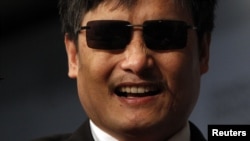BEIJING —
It has only been a few weeks since China undertook its once-in-a-decade leadership transition, but expectations for change are rising. Regardless of whether it is the slowing economy, or bettering the China’s legal system and minimizing government corruption, public interest in “reform” is growing.
Buzzworthy
Flip through any newspaper in China or click on any Chinese language news website or the country’s wildly popular Twitter-like micro blogging services and discussions about reform are easy to find.
Jin Canrong, a political scientist at Beijing’s Renmin University of China, acknowledges that reform proposals are drawing attention. “Everyone hopes for reforms, but at the same time everyone has different ideas on what reform is, the concept of reform is dense," he said. "For example your 'reform' is different than my 'reform'. In the hearts of 100 people it is possible that there are 102 ideas of reform and because of that reform is a very hot topic right now."
Some proposals have called for explicit, and in some cases radical changes. On Monday, several newspapers in Beijing carried stories about one of China’s top new leaders Wang Qishan and a recent meeting where publicly disclosing the private assets of officials was discussed. Such transparency would be revolutionary for a government that places a premium on secrecy.
Late last week, Communist Party leader Xi Jinping delivered a speech that was widely carried by state media and focused on what he called the “great renewal of the Chinese nation.”
Not a goal, but a tool
Jin Canrong says Xi’s speech laid out clearly that his idea of national rejuvenation was a national goal and that the way China would reach that goal is by reforming when and where needed. "Reform is not the goal it is a tool, the goal is national rejuvenation, it is not reform for itself but to realize bigger goals,” Jin stated.
Some Western analysts are convinced that Xi and his team of six other Chinese officials will not be able to push forward with greater political and economic openness. They argue that there are too many obstacles within China’s system of government, the military, the security apparatus, the country’s powerful and wealthy state-owned enterprises and other forces that will make change impossible.
Government critics such as blind Chinese activist Chen Guangcheng are warning that China must reform now or face much dire consequences. In a videotaped address released Sunday, to mark Human Rights Day, Chen appealed directly to Xi, addressing him by name.
Chen says the entire nation is watching Xi to see whether he listens to the will of the people and carries out reforms or hijacks the government and protects those in power. Chen says that, if Xi does not take steps to defend human rights and uphold the rule of law, China will go through a violent transition.
"The whole nation is watching you. Whether you follow the mandate of heaven and the will of the people and carry out reform or you hijack the government and protect the privileged [i.e. those in power] foretells whether our motherland will go through a peaceful or a violent transition," Chen said.
But change has never been easy in a country that is as tightly controlled as China.
One recent example highlights not only the growing awareness of the need for reform, but also the government’s reluctance to change.
On Sunday, state-backed news media picked up reports from Chinese newspapers about what could have been a significant court ruling.
Resistance
The reports said that a man had been sentenced to a year and a half in prison for illegally detaining individuals who came to Beijing have their complaints heard by the central government.
Such illegal detention centers or “black jails” have long been controversial in China for operating outside of the law. State media have reported that more than 70 sites exist around Beijing.
A court ruling against them would be a critical indication that the government could be cracking down. However, soon after the story on the court ruling, state media retracted the report and later said it was false.
When the Foreign Ministry was asked about the mysterious report on Monday, the spokesman replied with a flat denial. “Black jails do not exist.”
Analysts say that as long as problems are too sensitive to be addressed, the prospect for reform will continue to remain dim.
Buzzworthy
Flip through any newspaper in China or click on any Chinese language news website or the country’s wildly popular Twitter-like micro blogging services and discussions about reform are easy to find.
Jin Canrong, a political scientist at Beijing’s Renmin University of China, acknowledges that reform proposals are drawing attention. “Everyone hopes for reforms, but at the same time everyone has different ideas on what reform is, the concept of reform is dense," he said. "For example your 'reform' is different than my 'reform'. In the hearts of 100 people it is possible that there are 102 ideas of reform and because of that reform is a very hot topic right now."
Some proposals have called for explicit, and in some cases radical changes. On Monday, several newspapers in Beijing carried stories about one of China’s top new leaders Wang Qishan and a recent meeting where publicly disclosing the private assets of officials was discussed. Such transparency would be revolutionary for a government that places a premium on secrecy.
Late last week, Communist Party leader Xi Jinping delivered a speech that was widely carried by state media and focused on what he called the “great renewal of the Chinese nation.”
Not a goal, but a tool
Jin Canrong says Xi’s speech laid out clearly that his idea of national rejuvenation was a national goal and that the way China would reach that goal is by reforming when and where needed. "Reform is not the goal it is a tool, the goal is national rejuvenation, it is not reform for itself but to realize bigger goals,” Jin stated.
Some Western analysts are convinced that Xi and his team of six other Chinese officials will not be able to push forward with greater political and economic openness. They argue that there are too many obstacles within China’s system of government, the military, the security apparatus, the country’s powerful and wealthy state-owned enterprises and other forces that will make change impossible.
Government critics such as blind Chinese activist Chen Guangcheng are warning that China must reform now or face much dire consequences. In a videotaped address released Sunday, to mark Human Rights Day, Chen appealed directly to Xi, addressing him by name.
Chen says the entire nation is watching Xi to see whether he listens to the will of the people and carries out reforms or hijacks the government and protects those in power. Chen says that, if Xi does not take steps to defend human rights and uphold the rule of law, China will go through a violent transition.
"The whole nation is watching you. Whether you follow the mandate of heaven and the will of the people and carry out reform or you hijack the government and protect the privileged [i.e. those in power] foretells whether our motherland will go through a peaceful or a violent transition," Chen said.
But change has never been easy in a country that is as tightly controlled as China.
One recent example highlights not only the growing awareness of the need for reform, but also the government’s reluctance to change.
On Sunday, state-backed news media picked up reports from Chinese newspapers about what could have been a significant court ruling.
Resistance
The reports said that a man had been sentenced to a year and a half in prison for illegally detaining individuals who came to Beijing have their complaints heard by the central government.
Such illegal detention centers or “black jails” have long been controversial in China for operating outside of the law. State media have reported that more than 70 sites exist around Beijing.
A court ruling against them would be a critical indication that the government could be cracking down. However, soon after the story on the court ruling, state media retracted the report and later said it was false.
When the Foreign Ministry was asked about the mysterious report on Monday, the spokesman replied with a flat denial. “Black jails do not exist.”
Analysts say that as long as problems are too sensitive to be addressed, the prospect for reform will continue to remain dim.





